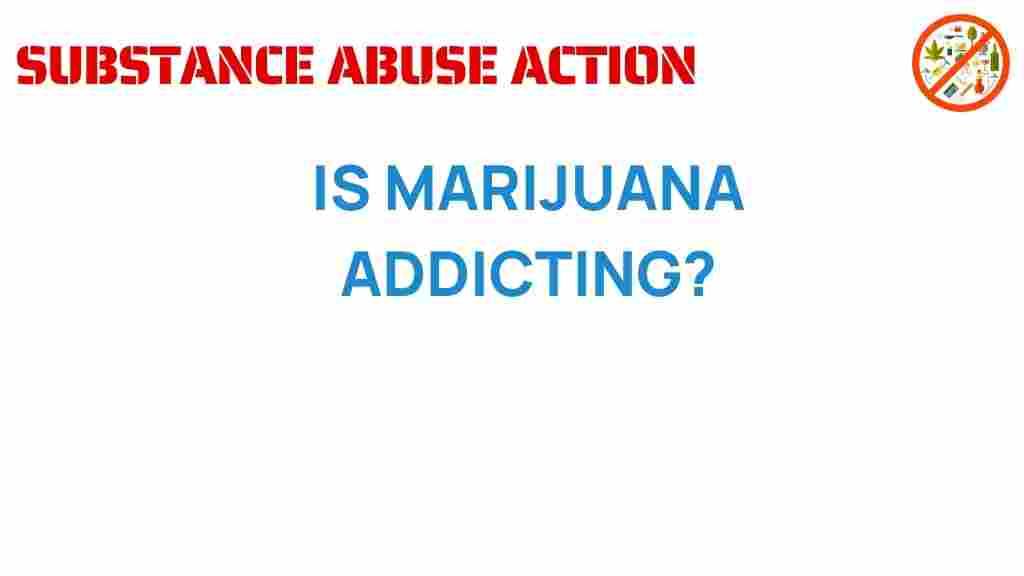Unraveling the Truth: Is Marijuana Addicting?
Marijuana, also known as cannabis, has been a hot topic of discussion in recent years, especially as more states and countries legalize its use for both medical and recreational purposes. However, amidst the growing acceptance of cannabis, a crucial question remains: is marijuana addicting? Understanding marijuana addiction, its effects on mental health, and the implications for substance use recovery is essential for anyone considering its use. This article delves into the research surrounding marijuana, its potential for dependence, and the ways to prevent misuse.
Understanding Marijuana and Its Effects
Marijuana is derived from the Cannabis sativa plant and contains various compounds, including THC (tetrahydrocannabinol) and CBD (cannabidiol). THC is the psychoactive component responsible for the “high” associated with marijuana use. While many users report positive effects, such as relaxation and euphoria, marijuana can also have negative effects, particularly when used excessively.
- Short-term effects: These can include altered senses, mood changes, impaired memory, and difficulty with problem-solving.
- Long-term effects: Chronic use can lead to addiction, cognitive deficits, and mental health issues.
What is Marijuana Addiction?
Marijuana addiction, or cannabis use disorder, is characterized by a compulsive pattern of marijuana use despite negative consequences. It can result in a range of symptoms that affect an individual’s life significantly. Understanding the concept of addiction is crucial as it often overlaps with mental health issues.
Research on Marijuana Dependence
Recent studies have shown that while marijuana is less addictive than substances like alcohol or opioids, it is not without risks. Research indicates that about 9% of those who use marijuana will develop a dependence on it, and this number increases to 17% for those who start using in their teens.
- Factors that may contribute to marijuana dependence include:
- Genetic predisposition
- Age of first use
- Frequency and quantity of use
- Co-occurring mental health disorders
Signs of Marijuana Dependence
Recognizing the signs of marijuana dependence is essential for prevention and recovery. Some common indicators include:
- Increased tolerance (needing more marijuana to achieve the same effects)
- Withdrawal symptoms when not using (irritability, insomnia, loss of appetite)
- Using marijuana in larger amounts or for longer than intended
- Desire or unsuccessful efforts to cut down on use
- Neglecting responsibilities or activities in favor of using marijuana
The Impact on Mental Health
The relationship between marijuana use and mental health is complex. While some individuals use cannabis to cope with anxiety or depression, research suggests that heavy use can exacerbate these conditions. It is essential to consider the following:
- Psychosis: High doses of THC can trigger psychotic episodes, particularly in those predisposed to mental health disorders.
- Anxiety and Depression: Regular use may lead to increased anxiety and depressive symptoms over time.
- Cognitive Impairment: Long-term marijuana use can impact memory, attention, and learning.
Recovery from Marijuana Addiction
If you or someone you know is struggling with marijuana addiction, recovery is possible. Here are some essential steps in the recovery process:
- Recognize the Problem: Acknowledging that marijuana use is causing issues in your life is the first step toward recovery.
- Seek Professional Help: Therapy and counseling can provide the support needed to overcome dependence. Cognitive-behavioral therapy (CBT) is particularly effective.
- Build a Support Network: Surround yourself with supportive friends and family who understand your journey.
- Consider Medication: In some cases, medications may help manage withdrawal symptoms and co-occurring mental health issues.
Prevention Strategies for Marijuana Misuse
Preventing marijuana dependence requires a multifaceted approach. Here are some effective strategies:
- Education: Informing individuals, especially teenagers, about the risks associated with marijuana use can deter misuse.
- Promotion of Healthy Coping Mechanisms: Encourage activities like exercise, meditation, and hobbies as alternatives to substance use.
- Monitoring Use: Keeping track of how often and how much marijuana is used can help identify problematic patterns early.
Troubleshooting Tips for Marijuana Misuse
If you find yourself using marijuana more frequently than intended, consider the following troubleshooting tips:
- Set Limits: Establish clear boundaries for your marijuana use, including frequency and quantity.
- Identify Triggers: Keep a journal to note when and why you use marijuana. Identifying triggers can help you develop strategies to avoid them.
- Engage in Alternative Activities: Find new hobbies or activities that keep you busy and reduce the urge to use marijuana.
Conclusion
In conclusion, the question of whether marijuana is addicting is complex and multifaceted. While many people use cannabis without developing dependence, a significant portion of users may experience issues related to addiction. Understanding the effects of marijuana on mental health, recognizing the signs of dependence, and taking proactive steps for prevention and recovery are essential for maintaining a healthy relationship with this substance.
If you or someone you know is struggling with marijuana addiction, seeking help from a professional can be a vital step toward recovery. For more information on substance use and mental health, consider visiting Substance Abuse and Mental Health Services Administration.
Remember, knowledge is power. By educating ourselves about marijuana, its effects, and the potential for addiction, we can make informed decisions that promote our health and well-being.
For additional resources and support, check out National Institute on Drug Abuse.
This article is in the category Addiction and created by SubstanceAbuseAction Team
